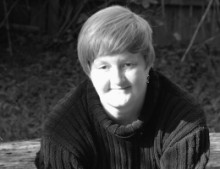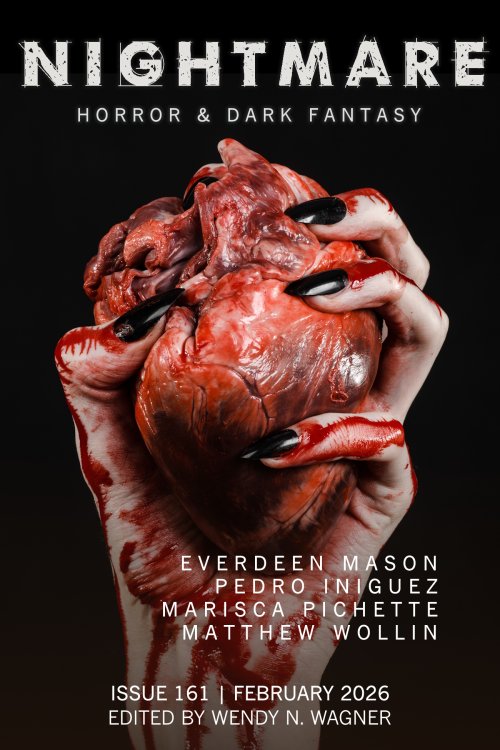“Six Hangings in the Land of Unkillable Women” is rich and textured with a sense of the era and the dark improbabilities of the events as they unfold. What inspired this particular story?
I wrote this story at the Clarion Science Fiction and Fantasy Writers Workshop in San Diego, and my first week there, maybe even my first day, I picked a book off the library shelf: Twentieth-Century Hangings, by Peter Wilson. It was a registry of every execution in Great Britain from 1900-1964. I’d say 95% of the victims of the original crime were women. And a lot of the men who murdered or tried to murder them had all, in some way, been humiliated: cuckolds, outsiders, jobless, luckless. Now, it’s one thing to read about misogyny and male fragility in a think piece—and I work in social services, so I like to think I have a strong stomach, I see a lot of this already—but I could not shake this dense little rage over these women who’d been killed so long ago. There was one woman I read about who did escape, much like the first entry in the story reads: the necklace broke, he cut her throat but not deeply, and she ran out on to the street calling for help. Her attacker, already pathetic, was even more pathetic. He couldn’t even pull off misogyny right. It hit that horrifying-funny-horrifying note I love to read in dark fiction. That cinched it: that was the world I wanted to write in.
I should also say, I had recently finished Henry James’s Portrait of a Lady and Catherynne M. Valente’s The Refrigerator Monologues. So, I guess this is what you get when you cross the two, if you were ever wondering.
This story is a wonderful platform for a number of issues—women’s rights, sexism, classism, domestic violence—all framed by a series of horrific events. Many people feel that politics and social commentary have no place in fiction, while others insist some of the best short fiction has been born of such commentary. What are your thoughts on the matter of fiction, particularly short fiction, to address social and political issues?
Fiction is always political, especially when the author pretends it isn’t. The choice of what to depict and not depict is a judgment about which stories we privilege. To paraphrase something Rabih Alameddine has said much better (bit.ly/2kP75E0): If, while the news is full of women calling out powerful men who subjected them to sexual violence, I’m writing a story about a man reconciling with his estranged werewolf father, that’s a political decision. That’s not to say there isn’t a great story there too, or that it’s bad or wrong to write that werewolf story, but we’re kidding ourselves if we say it’s a neutral choice driven only by apolitical, literary concerns. Stories that understand how they’re political can do a lot of good, and be a real thrill to read. I think what people chafe at in “political” fiction is didacticism—a lack of curiosity and surprise on the author’s part, which can make the story feel suffocating. Although for me some of those “apolitical” stories can be just as suffocating.
This is a weird story for me to write, too, because as a cis man I don’t get directly exposed to the kind of violence the story focuses on. My hope is that this contributes rather than detracts from the story—that it reinforces the notion that misogyny is everyone’s problem, and everyone should be engaging with it. But the story definitely surprised me. It still makes me nervous, which is a good thing.
To me, the horror in this story is Edith’s loss of agency and control over the situation, how the policeman uses her as a tool to pull the lever, denying Edith her free will in the face of the hunger of the crowd of men. Do you feel that the definition of horror changes depending on how a person identifies with the world, whether it be in relation to gender, sex, religion, race, or any number of other factors?
I think that’s right: Edith is so powerful, in so many ways, but there’s never a lack of awful men ready to grab power back from her. It’s the horror of backlash.
One of my first literary loves is Gothic fiction, so I come to horror disposed to think of it as a feminine-gendered form. A vulnerable woman locked in a castle, or a mountain abbey, leveraging what agency she has left to resist her persecutor. But then, Victorian fiction focused the genre on the Monster, who is so often built out of social anxieties over race, class, gender, etc.: think of how Stoker describes Dracula with pseudo-Jewish features and predatory sexuality, or how Poe describes the Tsalal aborigines in The Narrative of Arthur Gordon Pym. One of the things I love in contemporary horror is writers like Carmen Machado, Victor LaValle, or Mat Johnson taking these monsters and reclaiming them as the heroine locked in the castle. We get the horror—and sometimes an uneasy power—of understanding one’s own body to be monstrous. I wanted Edith to get a piece of that power, too.
What first enticed you to dip your toes into the waters of short fiction?
Reading short fiction! I still remember how it felt to read “The Monkey’s Paw” and “The Veldt” in middle school: that feeling of having traveled without noticing. You look up from the last page, twenty minutes later, and you’re not where you were, or who you were, when you read the first line. Novels can be just as transformative, but unless you’re a much faster reader than I am, there isn’t that shock of rejoining the world.
As a writer, short fiction is fun because you can try out some truly bizarre stuff. Or take on an idea that’s a little too hot to handle for an extended period. I mean, no one wants to read “312 Hangings in the Land of Unkillable Women.” Six is plenty.
Your work has appeared in any number of fiction and non-fiction venues. What’s next for Theodore McCombs? What can readers look forward to in 2018?
I have five other Clarion stories to whip into shape, so I’m excited for that. I’m also working on a historical novel about Otto Rahn, who was a medievalist scholar, amateur Holy Grail-hunter, and an openly gay man embroiled in the Nazis’ occult research projects. My friends in Denver and I run a blog, FictionUnbound.com, that reviews literary sci-fi, fantasy, and horror, so you’ll see me on there sharing ramblings similar to the ones above. Personally, I can’t wait to see what kind horror fiction folks have been working on this last year. Can you imagine?









